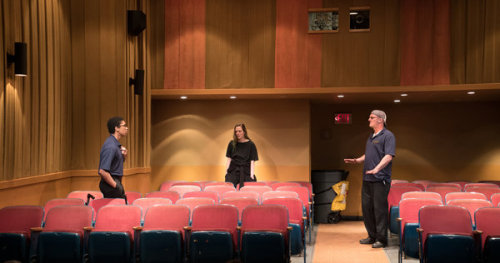
This winner of the 2014 Pulitzer Prize for Drama is serious theatre. Not because it addresses serious subject matter, concerning itself with the lives of three minimum wage workers at a dying single-screen movie theater in Massachusetts. Sure, they have their issues (when you’re 35, working for $8.35/hour and living in your parents’ attic, you’re bound to have some regrets), but the failed dreams of 20- and 30-somethings generally lacks a certain gravitas. No, The Flick must be serious drama because it clocks in at a hefty three-hour+ running time, putting in more in line with The Iceman Cometh and Death of a Salesman than, say, Avenue Q.
Much of the length of The Flick is due to long pauses between moments of action, between lines, between scenes, between pretty much everything. Nothing happens quickly here. But if you get into the flow and they rhythm of The Flick, there’s real richness to be mined. There are but three characters (and two cameos by another actor): Sam, the aforementioned 30-something senior usher; Avery, a 20-year old African-American man who loves movie with a passion that could likely be diagnosed as Aspergian; and Rose, a moody, standoffish projectionist who speaks in almost constant uptalk, turning common declarative statements into questions.
There are inappropriate crushes, games of six degrees of separation (at which Avery is a savant of the highest order), and lots and lots of sweeping up of spilled popcorn and other assorted detritus. During it all, we get to go inside these characters. And even though we never get down to why Sam has been unable to rise above his menial labor, we do get a deep sense of the shame he feels, yet hides beneath a veneer of ignorant superiority. Rose is similarly adrift in her own world, seemingly content on her pinballing course from boyfriend to boyfriend, never staying with one for more than four months.
But it’s Avery we get to know best – or at least understand the most. He’s the only one of the three to exhibit any real standards of behavior – both his own, and what he expects from others. When he states that there has been no great American film in the past decade, and Sam offers “Avatar” as a possibility, Avery simply doesn’t know how to respond to such a ludicrous suggestion. Avery believes digital technology is ruining the movie business, and vows that if the theater ever abandons the projection of film, he’ll have to quit. But his high standards also let him down, because the world fails to meet them. This leads to disappointment and depression.
As their concerns and anxieties intersect, The Flick flows slowly forward to a sad, resigned – but ultimately hopeful – resolution. Something that you’d be forgiven thinking would ever come during its long, long running time.

No comments:
Post a Comment